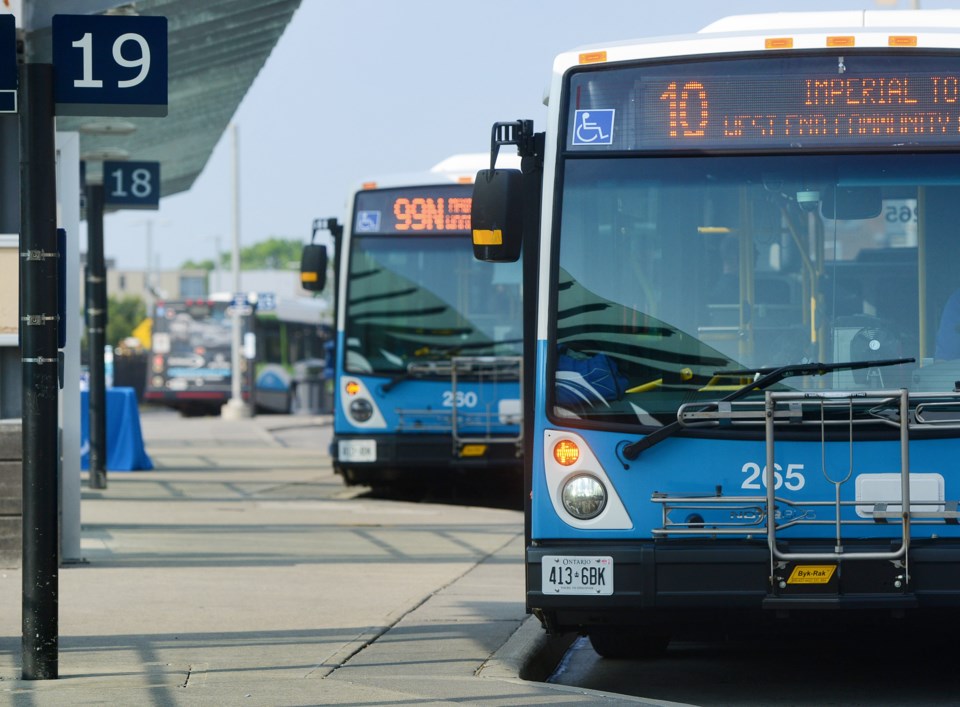The city’s transit system is about to undergo a significant shift, pending budget approval early next month.
During a special meeting on Monday evening, council unanimously approved a plan that will see routing move away from the current hub and spoke system, which requires many riders to transfer downtown in order to reach their destination, to a grid-like system intended to offer more direct and less lengthy rides.
“The main objective … is to create a competitive, convenient and reliable network that meets the needs of today’s and tomorrow’s customers,” said Andrea Mikkila, Guelph Transit’s planning and scheduling supervisor, adding the goal is to “get people out of cars” and onto buses.
“There are many social, environmental and economic benefits to investment in transit, both direct and indirect.”
In addition to route changes, several new routes will be added, including a regular one into Hanlon Creek Business Park, with some removed or consolidated with other routes. It also includes on-demand Sunday and holiday services, along with fewer one-way loops.
With more direct routes and targeted increases to frequency, the council-approved plan is expected to decrease travel time for riders. As a result, staff believe it will increase ridership to 10 million over the next 13 years, an increase of 4.29 million, with about 13 per cent of travel in the city being done by transit, compared to 11 per cent in 2017.
“The more we can have people make some of their trips by transit, the better off our city will be,” stated deputy CAO Jayne Holmes. Increased transit ridership means fewer vehicles on the road and lower greenhouse gas emissions.
While applauding the goal, nearly all of the nine delegates who addressed council on Monday evening urged a more aggressive approach that would further increase ridership and lower greenhouse gas emissions.
Amelia Meister asked council to hold off on making a decision until an option is identified that could increase ridership 50 per cent by 2030.
“Truly climate change is the biggest threat that humanity has ever faced,” she said. “I think we really need to be more ambitious because the climate emergency demands it.”
“The world is changing and Guelph must modernize to stay competitive,” added Barbara Sim.
If the budget is approved next month, the new approach would begin next year, with most of the changes taking place during the first seven years of the 10-year plan, states a staff report.
Funding for the plan is not currently included in the city’s draft budget, which currently features a 3.64 per cent property tax increase next year and 4.69 per cent in 2023.
If confirmed by council, it would add a further 1.26 and 0.45 per cent respectively to property tax bills.
A fare strategy review is set to launch in mid-2022, with a report and recommendation to council expected either late in the year or early 2023.
“Transit has to be highly subsidized for people to use it,” commented Coun. Dan Gibson, who said he would have liked to have that fare review come to council alongside the route review so they could be considered together. “Frequency comes with a cost and we have to place that cost somewhere.”
Guelph Transit currently offers 35 routes, using 62 buses, with 183 operators.
The council-approved plan requires 26 more buses with 122 additional staff.
Implementation is estimated to cost $13.08 million over 10 years of phased-in changes, with $253.9 million in capital investments to both expand and electrify the system. Some of that capital money is to come from development charges and upper-tier government grants and provincial gas tax funds.
Within the plan inter-regional transit would launch in 2025 with a route from Guelph Central Station into Cambridge, with one to Kitchener set to come onboard in 2026, followed by an Aberfoyle connection in 2027.
Council’s endorsement of the staff recommendation, pending budget approval, came after a motion to refer the issue to the Dec. 2 budget decision meeting failed nine to four.
Coun. Rodrigo Goller suggested the referral in order to provide staff with time to provide additional information about a higher frequecy option, which he expressed support for, as did councillors Bob Bell, Leanne Caron and James Gordon.
In support of referral were Mayor Cam Guthrie, Goller, Dan Gibson and Bob Bell.
Following approval of the staff recommendations, Coun. Dominique O’Rourke moved a motion directing staff to investigate possible upper-tier government funding regarding inter-regional transit, as well as potential cost-sharing agreements with the other municipalities, which she noted would also benefit from the service.
That, too, was unanimously approved, though Guthrie noted it’s not a new conversation.
